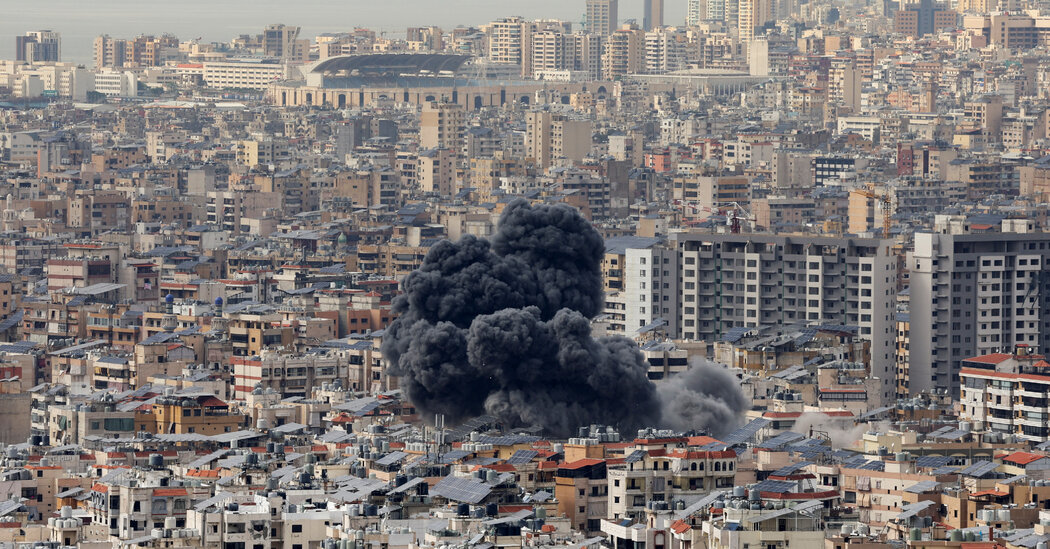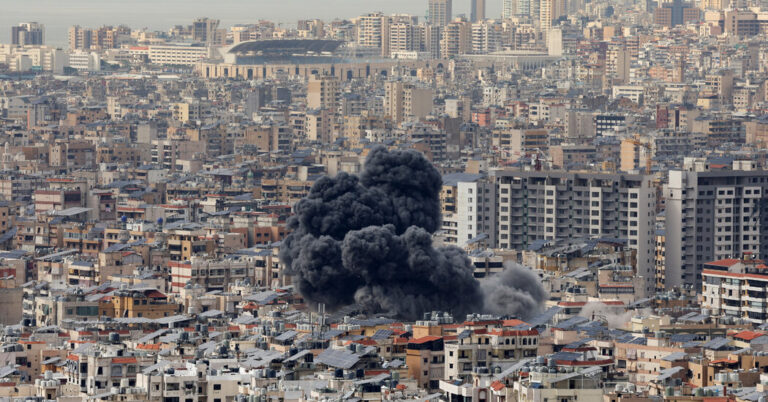The Israeli army launched aerial attacks in the southern suburbs of Beirut on Friday for the first time since a ceased fire in November entered into force in November, destroying months of calm tense in the Lebanese capital and fueling the fears of a further escalation.
The bombing came after the rockets were shot in the north of Israel from the Lebanese territory at the beginning of the day, triggering sirens against three communities near the border. The Israeli army subsequently ordered the residents of the Densally populated Hadath neighborhood of Dahiya, an area on the southern edges of Beirut, to evacuate from the vicinity of a building there.
Less than two hours later, air attacks began.
The Israeli army claimed to have targeted a site that stored the drones of Hezbollah, but did not explicitly blame the Lebanese militant group for the rocket fire at the beginning of the day. Hezbollah denied any involvement in the attack on Israel and said that the fire was engaged in the cease.
But this was the second this exchange of fires in less than a week, causing fears that the truce between Israel and Hezbollah could reveal.
The Lebanese army said he was investigating that he had shot the rockets. Hezbollah, who is still struggling to recover from the devastating 14 -month conflict with Israel, has little desire to risk turning on a conflict, according to experts. But Palestinian militant groups like Hamas also maintain a considerable presence in Lebanon, which mainly operates from refugee camps of decades. During the war in Gaza, these groups launched the rockets from Lebanon in the north of Israel intermittently.
After the attack led by Hamas on 7 October 2023 he turned on the war in Gaza, Hezbollah began to shoot rockets and drones in Israeli positions in solidarity with his Palestinian ally. After almost a year of low -level violence, the fights intensified in a vast scale war and an Israeli -earth invasion in front of the two parts agreed a ceased.
He marked the most fatal and most destructive conflict of Lebanon from the 15 -year civil war of the country, which ended in 1990.
Despite the truce, the Israeli forces have regularly attacked the southern and eastern Lebanon, but Dahiya, which is traditionally a support bastion for Hezbollah, had not been targeted since the ceased the fire had been agreed.
At least three people were killed in air attacks that hit the southern Lebanon on Friday, according to the Ministry of Health of Lebanon.
After the Israeli military issued the evacuation warnings, the surveillance drones began to mount above Beirut and the shots broke out in the Dahiya while the residents attempted to warn the neighbors of an imminent Israeli strike. The Lebanese authorities also ordered all the schools in the area to close and the parents hurried to collect screaming children. The students who spoke to the New York Times reported that they were ordered by teachers to get away from the windows and said their classmates interrupted in fear.
Pandemonium remembered the most intense days of the war, when the Israeli air attacks beat the southern suburbs of Beirut on an almost daily basis.
“People are panicked,” said Elie Hachem, director of the St. Therese hospital, about 600 meters from the targeted building. “I can hear the cars playing the horn like a crazy out of the street.”
The hospital, which had been seriously damaged in the war, was left unknown to the strike, but the victims soon started to get to the emergency room, said Hachem.
For now, he said, they were just trying to keep everyone calm.
The sirens of the air raid who warn the arrival rocket had come out on Friday before in the north of Israel, including the city of Kiryat Shmon. The Israeli army later said that one of the bullets was intercepted and another fell into the Lebanese territory.
Prime Minister Libanone, Nawaf Salam, ordered the country’s security forces to arrest the managers of the fire of the rocket, calling it “irresponsible” and a threat to “the stability and safety of Lebanon”, according to a declaration.
The Lebanese government is distinguished by Hezbollah, a militia supported by Iran and a political party that exercised a huge influence in Lebanon before the war. The new government has undertaken to bring all the weapons under state control – including Hezbollah’s – but it is not clear exactly when and how they will do it.
The United Nations Special Coordinator for Lebanon, Jeanine Hennis-Plasschaert, asked for moderation, warning that “a return to a wider conflict in Lebanon would be devastating”.
Hwaida Saad AND Dayana Iwaza Reports contributed by Beirut.





